New wave of COVID-19 infections in Thailand shines spotlight on employment situation of foreign workers
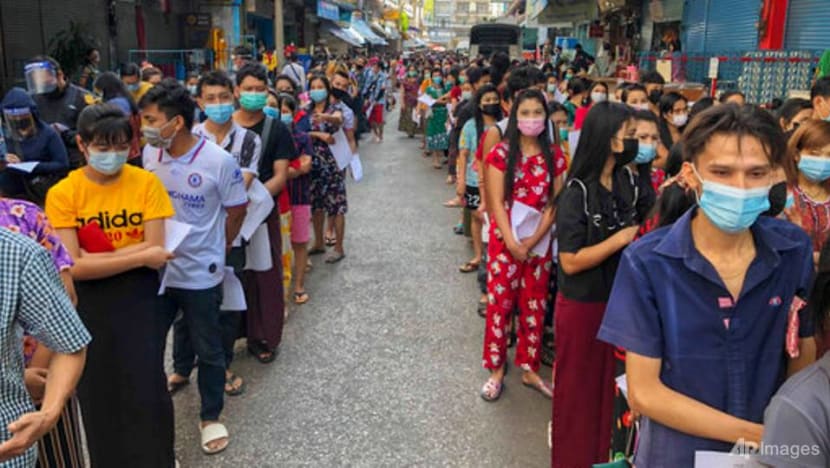
People stand in lines to get COVID-19 tests in Samut Sakhon, south of Bangkok, on Dec 20, 2020. (Photo: AP/Jerry Harmer)
BANGKOK: Pyi Some Aung has worked at the Central Shrimp Market in Samut Sakhon for 13 years. For the first time since he moved to Thailand from Myanmar, he is barred from leaving the premises.
His workplace became a major cluster of COVID-19 last month. The outbreak at the market has resulted in more than 3,000 infections so far, prompting authorities to close off the area and nearby apartments resided by thousands of foreign workers, mostly from Myanmar.
“The lockdown began on Dec 19. As soon as the announcement was made, military officers came here to bar every entrance and exit, stopping people from wandering outside. We can leave our rooms for a walk and live normally, but we’re not allowed to leave the market area,” said Pyi Some Aung.
“I haven’t been able to work yet.”
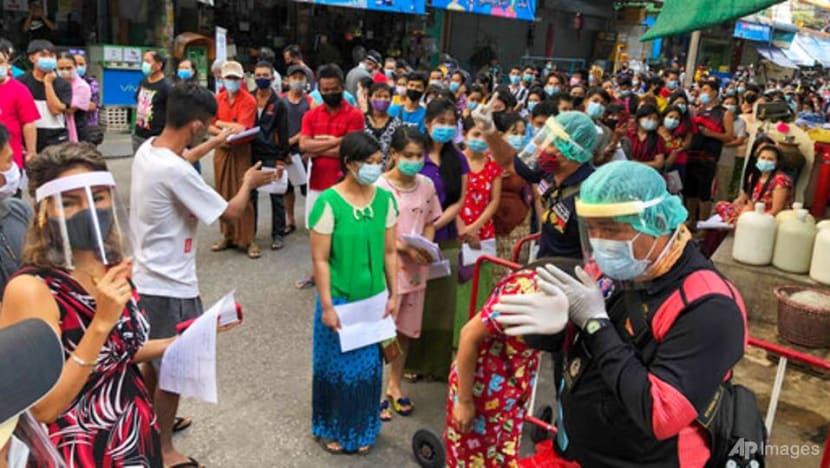
Mass transmission of COVID-19 in Samut Sakhon marked a new wave of infections in Thailand. A number of businesses have been affected by the outbreak and so have thousands of foreign workers, including Pyi Some Aung, who has lost his main income for weeks.
As COVID-19 continues to jeopardise business operators in Samut Sakhon, rights groups are concerned a number of migrants, particularly those who are not legally registered, could become jobless and be pressured to seek work elsewhere.
“Samut Sakhon took in workers when other areas in the country were on lockdown previously," said Adisorn Kerdmongkol from Migrant Working Group – a coalition of local NGOs advocating labour rights and welfare.
“A number of migrants here are working illegally and living secretly. They have no health security. So, we’re worried the situation could reverse. With factories closed, migrants would return to the same condition, which is jobless. They’d have to work elsewhere and that could be out of control. If that happens, we could face a big problem,” he added.
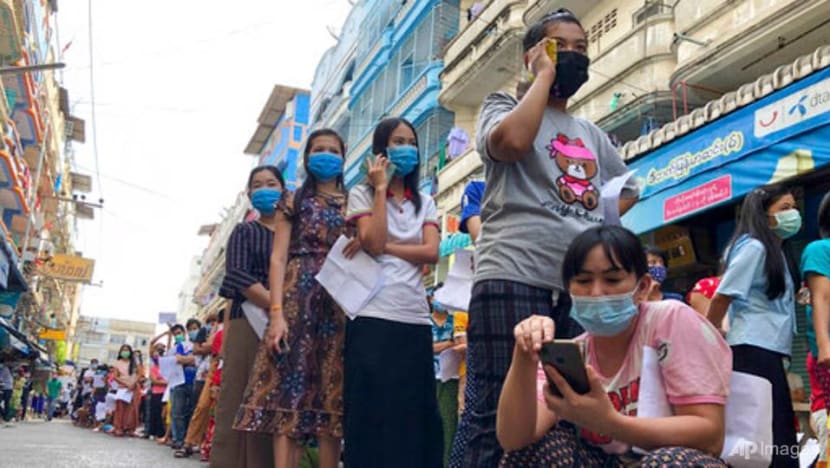
Last year, Thailand reported zero cases locally for several months. But the situation turned upside down after a 67-year-old Thai vendor at the Central Shrimp Market tested positive for the disease on Dec 17 despite no overseas travel records.
The Disease Control Department has so far reported more than 3,200 cases of COVID-19 in 44 provinces with links to the outbreak in Samut Sakhon. Its deputy director Tanarak Plipat said the employment situation of migrant workers is a cause for concern.
“If you ask whether we're worried, I have to say we are. But in terms of trying to stop the illegal entry of migrant workers into Thailand, this is the responsibility of other governmental units. At the same time, it's also the responsibility of the private sector, which has to understand and develop a policy of not employing these newly arriving workers," he told CNA.
KEEPING MIGRANT WORKERS EMPLOYED COULD LIMIT COVID-19 TRANSMISSION: NGO
Samut Sakhon is a coastal province southwest of Bangkok. It is a hub of Thailand’s seafood industry and home to a large number of factories and foreign workers.
Based on data from the Department of Employment, about 240,000 migrants are employed in the province. However, according to Adisorn, an estimated 200,000 others are believed to be working there illegally and some have already lost their jobs as a result of the recent outbreak.
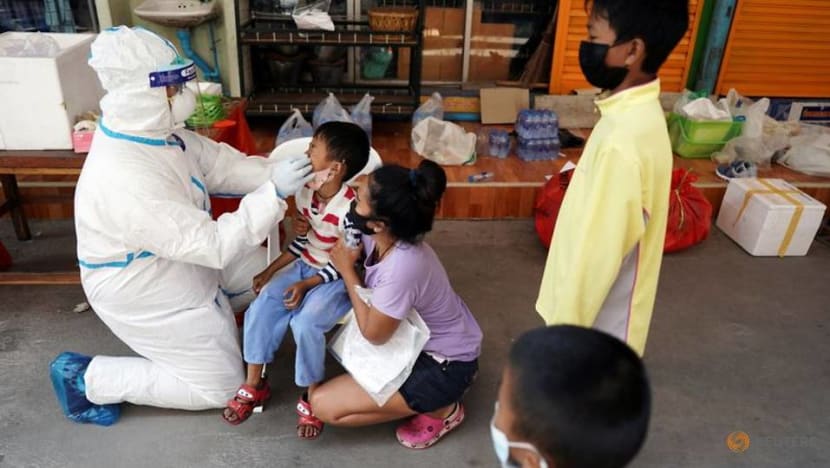
The temporary closure of the Central Shrimp Market means several businesses cannot operate. At the same time, Adisorn said, fear of inspection and arrest by the authorities have led some employers to lay off illegal foreign workers.
Pyi Some Aung said some migrants are worried about losing their jobs once the market reopens.
“Because the market isn’t open yet, nobody knows if they still have their jobs,” he told CNA.
Some are concerned they may not get their jobs back, their employers may not hire them again, or they wouldn’t be able to send money home because they aren’t working.
To prevent mass labour movements and limit the risk of transmission, Adisorn from Migrant Working Group said the Thai government needs to keep as many migrants employed as possible.
“We have to find out how to delay unemployment as much as possible. In case it has to happen, there should be some financial compensation to enable them to stay on and look for jobs in the province without having to go move elsewhere,” Adisorn told CNA.
“Eventually, when they really can’t stay there anymore and have to move, their movement should be directed by the Ministry of Labour, which could find them new employers in other areas while ensuring safe movement."
On Dec 29, the cabinet granted a special approval for foreign workers from Cambodia, Laos and Myanmar to continue residing and working legally in Thailand until Feb 13, 2023 amid the spread of COVID-19. The proposal was put forth by the Ministry of Labour as part of the government's efforts to control local transmission.
The target groups include Cambodian, Laotian and Myanmar nationals whose work permits have expired, undocumented foreign workers and their children aged no more than 18.
MASS TESTING KEY TO OVERALL EFFORT
Since the outbreak in Samut Sakhon, Thai health officials said they have drawn on Singapore's experience to control the transmission, with some adjustments to suit the local context. Infected patients are separated from the Central Shrimp Market for treatment at field hospitals, as proactive testing continues in foreign communities.
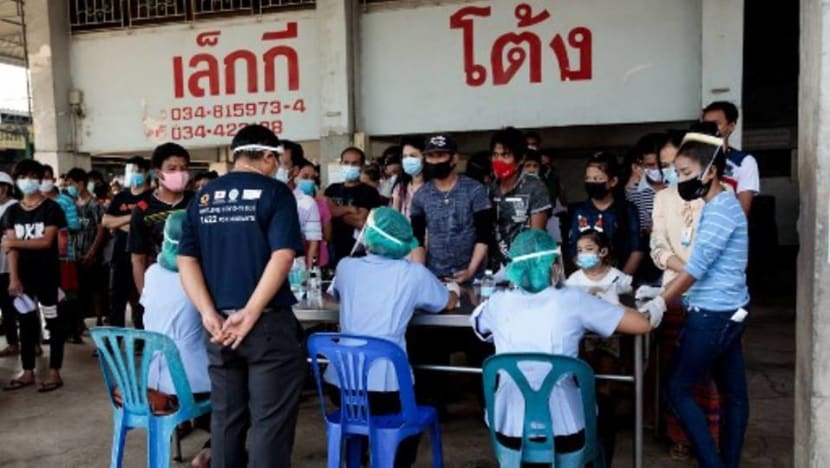
According to Tanarak, those who are confined in the market area and nearby apartments are patients who have recovered and residents testing negative for COVID-19 who continue to be monitored.
“There is no other way than to carry out tests in the Myanmar communities as much as possible and to do it faster than before, and this will need to continue for a while,” he said.
“However, it may be difficult to test every migrant worker because there are so many of them,” he added. “So, the strategy is to carry out tests and separate the patients in order to stop the transmission. It’s likely a lot of tests will be carried out almost weekly for an unknown period of time.”
On Tuesday (Jan 12), Thailand reported 287 new cases of COVID-19, bringing the total case number to 10,834. So far, 6,732 patients have recovered and 67 have died.














